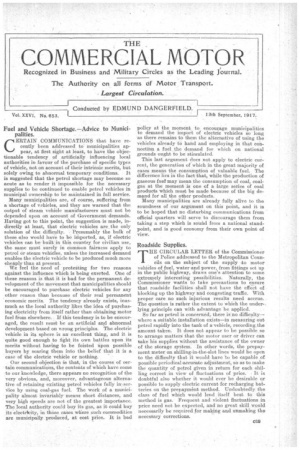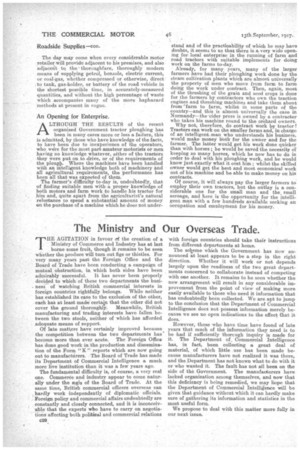Fuel and Vehicle Shortage.—Advice to Munici palities. .
Page 1

Page 2

If you've noticed an error in this article please click here to report it so we can fix it.
CERTAINCOMMUNICATIONS that have recently been addressed to municipalities appear, at first sight at least, to have the objectionable tendency of artificially influencing local authorities in favour of the purchase of specific types of vehicle, not on account of their intrinsic merits, but solely owing to abnormal temporary conditions. It is suggested that the petrol shortage may become so acute as to render it impossible for the necessary supplies to be continued to enable petrol vehicles in municipal ownership to be maintained in full service. Many municipalities are, of course, suffering from a shortage of vehicles, and they are warned that the output of steam vehicle manufacturers must not be depended upon on account of Government dernancbi. Having got to this point, the suggestion. is made, indirectly at least, that electric vehicles aresthe only solution of the difficulty. Presumably the bulk of these also would have to be imported, as, if electric vehicles can be built in this country for civilian use, the same must surely in common fairness apply to petrol or steam vehicles, unless the increased demand enables the electric vehicle to he produced much more cheaply than at present.
We feel the need of protesting for two reasons against the influence which is being exerted. One of these reasons is that it is bad for the permanent development of the movement that municipalities should be encouraged to purchase electric vehicles for any other reason than because of their real permanent economic merits. The tendency already exists, inasmuch as the local authority likes the idea of purchasing electricity from itself rather than obtaining motor fuel from elsewhere.. If this tendency is to be encouraged, the result must be an artificial and abnormal development based on wrong principles. The electric vehicle in its sphere is an excellent thing, and it is quite good enough to Sight its own battles upon its merits without having to be foisted upon possible buyers by scaring them into the belief that it is a ease of the electric vehicle or nothing. '
Our second objection is that, in the course of certain communications, the contents of which have come to our knowledge, there appears no recognition of the very obvious, and, moreover, advantageous alternative of retaining existing petrol vehicles fully iiiaservice by using coal-gas fuel. The work of a municipality almost invariablymeans short distances, and very high speeds are not of the greatest importance. The local authority could buy its gas, as it could buy its electrkity, in those cases where such earismoditiea are municipally produced, at cost price. It is bad
policy at the moment to encourage municipalities to demand the import of electric vehicles so long as there remains to them the alternative of using the vehicles already to hand and employing in that connectiOn a fuel the demand for which on national grounds ought to be stimulated.
This last argument does not apply to electric current, the generation of which in the great majority of oases means the consuniption of valuable fuel. The difference lies in the fact that, while the production of gaseous fuer may Mean the consumption of coal, coalgas at the moment is one of a large series of coal products whioh must be made because of the big demand foil all the other products. Many municipalities are already fully alive to the soundness of our argument on this point, and it is to be hoped that no disturbing communications from official quarters will serve to discourage them from taking a step which is sound from a national standpoint, and is good economy from their own point of view.
Roadside Supplies.
THE CIRCULAR LETTER of the Commissioner of Police addressed to the Metropolitan Councils on the subject of the supply to motor vehicles of fuel, water and power, from fittings set up in the public highway, draws one's attention to some extremely interesting possibilities. Naturally, the Commissioner wants to take precautions to ensure that roadside facilitiesshall not have the effect of blocking up the highway and congesting traffic. With proper care no such injurious results need accrue. The question is rather the extent to which the under-. lying.principle can with advantage be applied. So far as petrol is concerned, there is no difficulty— where a suitable installation exists—in measuring out petrol rapidly into, the tank of a:vehicle, recording,the amount taken. It does not appear to be possible so to arrange matterS that the motor user or driver can take his supplies without the assistance of the owner of the storage system. In other words, the prepayment meter onshilling-in-the-slot lines would be open to the difficulty that it would • have to be capable .of possible periodical accurate adjustment, no as to make the quantity of petrol given in return for each .shilling correct in view of fluctuations of price. • It is doubtful also whether it would -ever be desirable or possible to supply electric current for recharging batteries on the prepaymAnt method. Undoubtedly the class of fuel which would lend itself best to this method is gas. Frequent and violent fluctuations in price need not be expected, and no great skill would necessarily be required for making and unmaking the necessary corrections. The day may come when every considerable motor retailer will provide adjacent to his premises, and also adjacent to the thoroughfare, thoroughly modern means of supplying petrol, benzole, electric current, or coal-gas, whether compressed or otherwise, direct , to tank, gas-holder, or battery of the road vehicle in the shortest possible time, in accurately-measured quantities, and without the high percentage of waste which accompanies many of the more haphazard methods at present in vogue.
An Opening for Enterprise.
ALTHOUGH THE RESULTS of the recent organised Government tractor ploughing has been in many cases more or less a failure, this is admitted, by those who have knowledge of the facts, to have been due to inexperience of the operators, who were for the most part amateur motorists or men having no knowledge whatever, either of the tractors they were put on to drive, or of the requirements of the plougt. Where the machines have been handled with an intelligent knowledge both of machinery and all agricultural requirements, the performance has been all that was expected of them. The farmer's difficulty to-day is, uncloulatedly, that of finding suitable men with a proper knowledge of both motors and farm work to handle his tractor for him and, quite apart from the agriculturist's natural reluctance to spend a substantial amount of money on the purchase of a machine which he does not under stand and of the practicability of which he may have doubts, it seems to us that there is a, very wide opening for local enterprise in the running of farm and road tractors with suitable implements for doing work on the farms to-day. • Already, for many years, many of the larger farmers have had their ploughing work done by the steam cultivation plants which are almost universally the property of men who move from farm to farm doing the work under contract Then, again, most of the threshing of the grain and seed crops is done for the farmers by contractors who own the traction engines and threshing machines and take them about from "farm to farm, whilst in some parts of the country—and this is -almost universally the case in Normandy—the cider press is owned by a contractor who takes his machine round to the orchard owners.
Why not, therefore, do contract work by tractor ? Tractors can work on the smaller farms and, in charge of an intelligent ,man who understands his business, would make money both for the owner and for the farmer. The latter would get his work done quicker than with horses ; he would be saved the necessity keeping so many horses, which he now has to do in order to deal with his ploughing work, and he would know just exactly what it cost bun ; whilst the skilled owner would get the best and most economical work out of his machine and be able to make money on his contracts.
Of course, it will always pay the larger farmers to employ their own tractors, but the outlay is a considerable one for the small man and the small acreage, and here is the opportunity for the intelligent man with a few hundreds available seeking an occupation and employment for his money.






















